UK Law: Examining Classifications, Sources, and Employer Obligations
VerifiedAdded on 2023/06/18
|9
|2826
|433
Report
AI Summary
This report provides a detailed analysis of the UK legal system, beginning with a classification of laws into criminal and civil law, and identifying various legal systems in the UK. It discusses the role of courts in the UK, including the High Court and the Supreme Court. The report elaborates on case law as a source of laws and explains delegated legislation with examples. It then transitions to UK law-making processes, focusing on the statutory duties of employers towards employees, including hygiene, timely payment, and non-discrimination. Finally, the report differentiates between wrongful dismissal and unfair dismissal actions, highlighting the importance of adhering to contractual obligations and employment law principles. This document is available on Desklib, a platform offering a wide range of study tools and solved assignments for students.

bmp4002
Paraphrase This Document
Need a fresh take? Get an instant paraphrase of this document with our AI Paraphraser
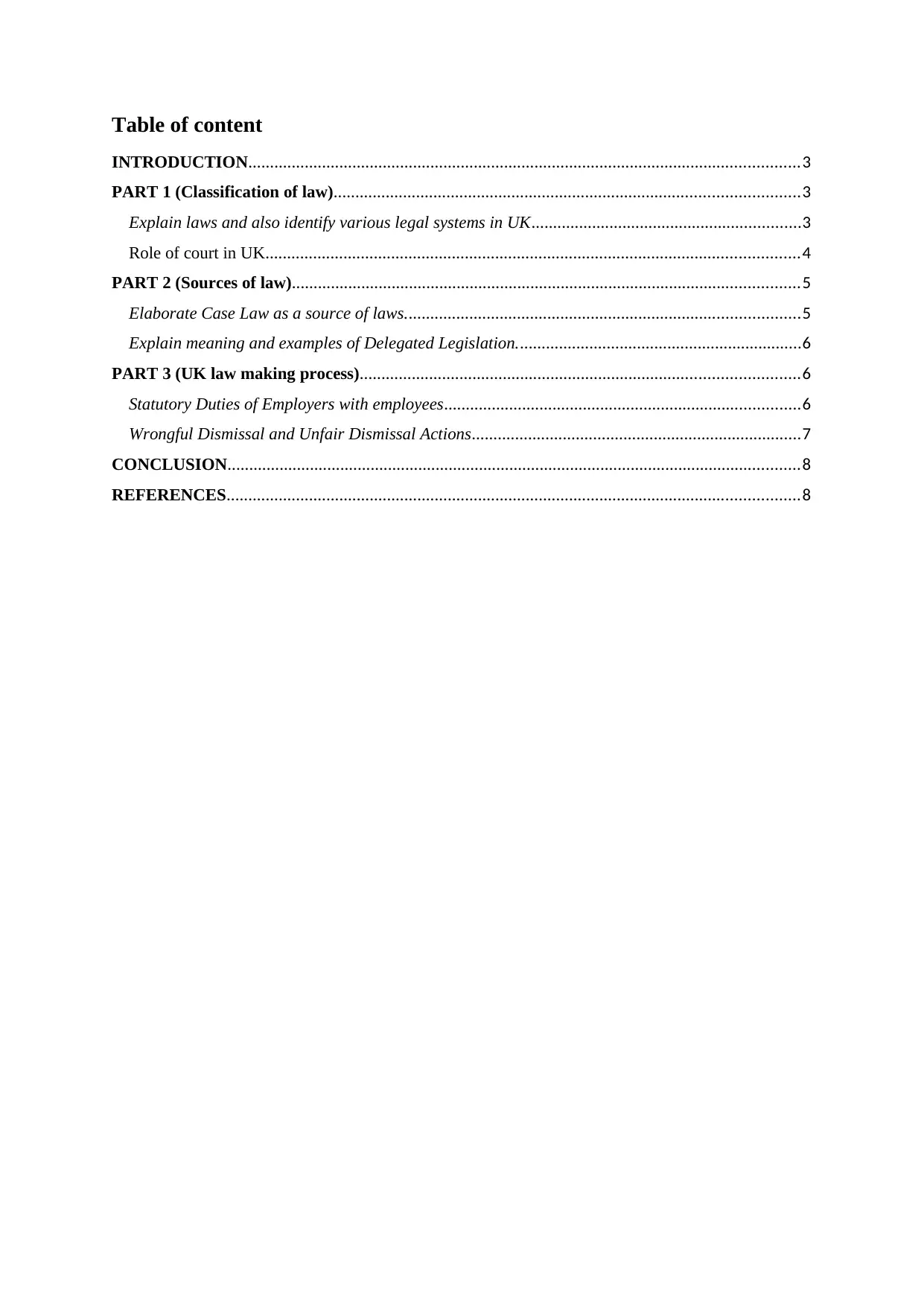
Table of content
INTRODUCTION...............................................................................................................................3
PART 1 (Classification of law)...........................................................................................................3
Explain laws and also identify various legal systems in UK..............................................................3
Role of court in UK...........................................................................................................................4
PART 2 (Sources of law).....................................................................................................................5
Elaborate Case Law as a source of laws...........................................................................................5
Explain meaning and examples of Delegated Legislation..................................................................6
PART 3 (UK law making process).....................................................................................................6
Statutory Duties of Employers with employees..................................................................................6
Wrongful Dismissal and Unfair Dismissal Actions............................................................................7
CONCLUSION....................................................................................................................................8
REFERENCES....................................................................................................................................8
INTRODUCTION...............................................................................................................................3
PART 1 (Classification of law)...........................................................................................................3
Explain laws and also identify various legal systems in UK..............................................................3
Role of court in UK...........................................................................................................................4
PART 2 (Sources of law).....................................................................................................................5
Elaborate Case Law as a source of laws...........................................................................................5
Explain meaning and examples of Delegated Legislation..................................................................6
PART 3 (UK law making process).....................................................................................................6
Statutory Duties of Employers with employees..................................................................................6
Wrongful Dismissal and Unfair Dismissal Actions............................................................................7
CONCLUSION....................................................................................................................................8
REFERENCES....................................................................................................................................8
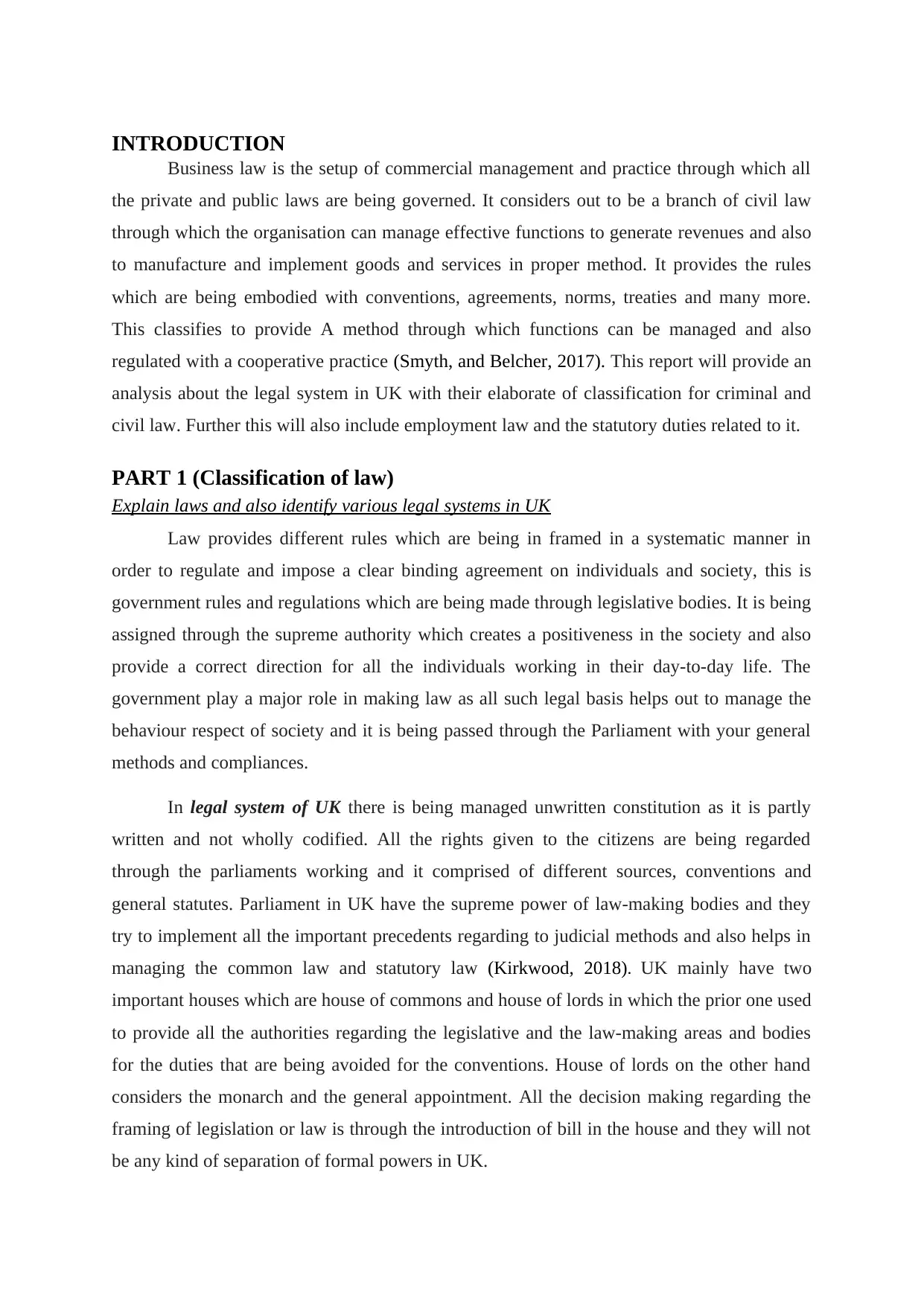
INTRODUCTION
Business law is the setup of commercial management and practice through which all
the private and public laws are being governed. It considers out to be a branch of civil law
through which the organisation can manage effective functions to generate revenues and also
to manufacture and implement goods and services in proper method. It provides the rules
which are being embodied with conventions, agreements, norms, treaties and many more.
This classifies to provide A method through which functions can be managed and also
regulated with a cooperative practice (Smyth, and Belcher, 2017). This report will provide an
analysis about the legal system in UK with their elaborate of classification for criminal and
civil law. Further this will also include employment law and the statutory duties related to it.
PART 1 (Classification of law)
Explain laws and also identify various legal systems in UK
Law provides different rules which are being in framed in a systematic manner in
order to regulate and impose a clear binding agreement on individuals and society, this is
government rules and regulations which are being made through legislative bodies. It is being
assigned through the supreme authority which creates a positiveness in the society and also
provide a correct direction for all the individuals working in their day-to-day life. The
government play a major role in making law as all such legal basis helps out to manage the
behaviour respect of society and it is being passed through the Parliament with your general
methods and compliances.
In legal system of UK there is being managed unwritten constitution as it is partly
written and not wholly codified. All the rights given to the citizens are being regarded
through the parliaments working and it comprised of different sources, conventions and
general statutes. Parliament in UK have the supreme power of law-making bodies and they
try to implement all the important precedents regarding to judicial methods and also helps in
managing the common law and statutory law (Kirkwood, 2018). UK mainly have two
important houses which are house of commons and house of lords in which the prior one used
to provide all the authorities regarding the legislative and the law-making areas and bodies
for the duties that are being avoided for the conventions. House of lords on the other hand
considers the monarch and the general appointment. All the decision making regarding the
framing of legislation or law is through the introduction of bill in the house and they will not
be any kind of separation of formal powers in UK.
Business law is the setup of commercial management and practice through which all
the private and public laws are being governed. It considers out to be a branch of civil law
through which the organisation can manage effective functions to generate revenues and also
to manufacture and implement goods and services in proper method. It provides the rules
which are being embodied with conventions, agreements, norms, treaties and many more.
This classifies to provide A method through which functions can be managed and also
regulated with a cooperative practice (Smyth, and Belcher, 2017). This report will provide an
analysis about the legal system in UK with their elaborate of classification for criminal and
civil law. Further this will also include employment law and the statutory duties related to it.
PART 1 (Classification of law)
Explain laws and also identify various legal systems in UK
Law provides different rules which are being in framed in a systematic manner in
order to regulate and impose a clear binding agreement on individuals and society, this is
government rules and regulations which are being made through legislative bodies. It is being
assigned through the supreme authority which creates a positiveness in the society and also
provide a correct direction for all the individuals working in their day-to-day life. The
government play a major role in making law as all such legal basis helps out to manage the
behaviour respect of society and it is being passed through the Parliament with your general
methods and compliances.
In legal system of UK there is being managed unwritten constitution as it is partly
written and not wholly codified. All the rights given to the citizens are being regarded
through the parliaments working and it comprised of different sources, conventions and
general statutes. Parliament in UK have the supreme power of law-making bodies and they
try to implement all the important precedents regarding to judicial methods and also helps in
managing the common law and statutory law (Kirkwood, 2018). UK mainly have two
important houses which are house of commons and house of lords in which the prior one used
to provide all the authorities regarding the legislative and the law-making areas and bodies
for the duties that are being avoided for the conventions. House of lords on the other hand
considers the monarch and the general appointment. All the decision making regarding the
framing of legislation or law is through the introduction of bill in the house and they will not
be any kind of separation of formal powers in UK.
⊘ This is a preview!⊘
Do you want full access?
Subscribe today to unlock all pages.

Trusted by 1+ million students worldwide
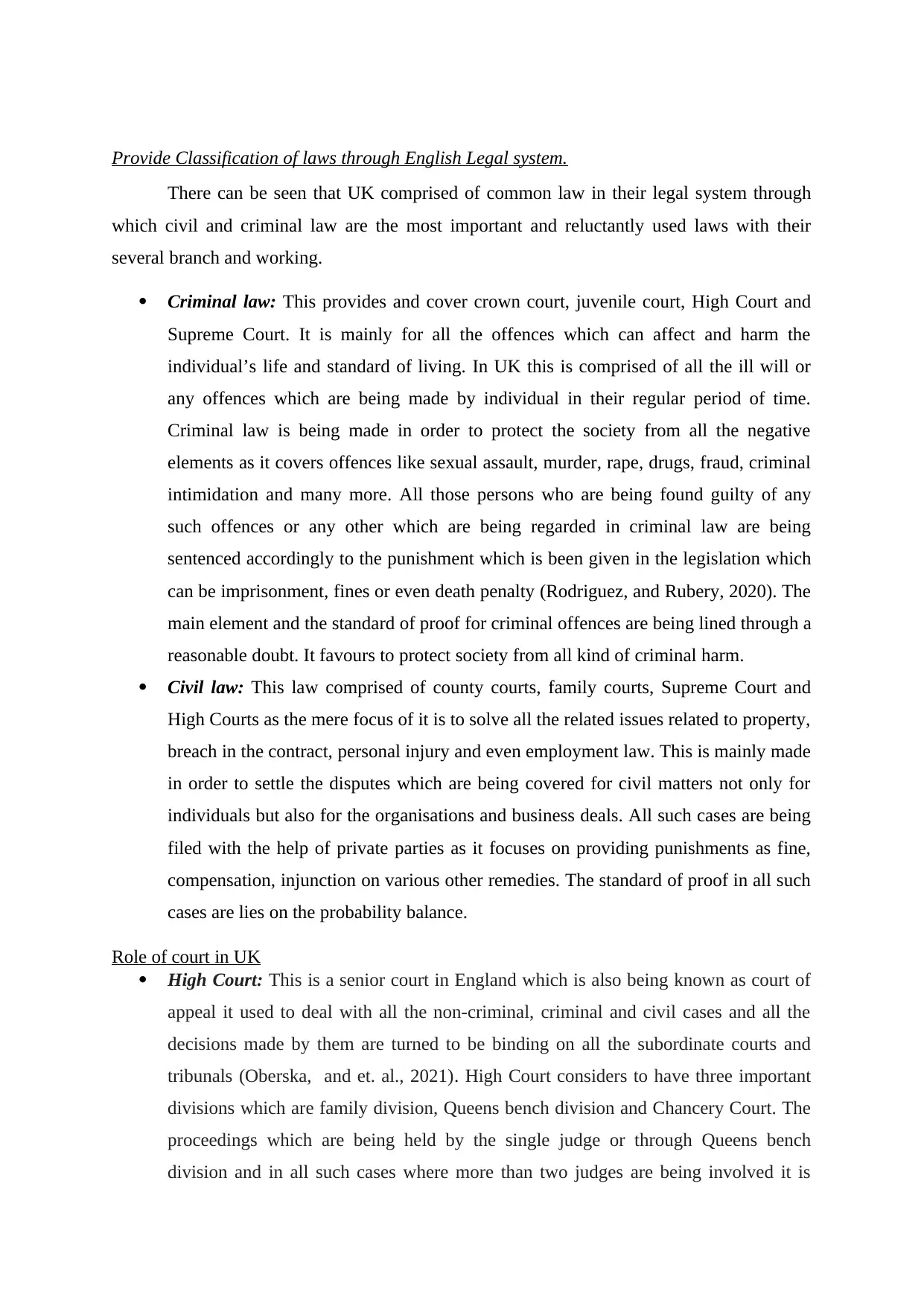
Provide Classification of laws through English Legal system.
There can be seen that UK comprised of common law in their legal system through
which civil and criminal law are the most important and reluctantly used laws with their
several branch and working.
Criminal law: This provides and cover crown court, juvenile court, High Court and
Supreme Court. It is mainly for all the offences which can affect and harm the
individual’s life and standard of living. In UK this is comprised of all the ill will or
any offences which are being made by individual in their regular period of time.
Criminal law is being made in order to protect the society from all the negative
elements as it covers offences like sexual assault, murder, rape, drugs, fraud, criminal
intimidation and many more. All those persons who are being found guilty of any
such offences or any other which are being regarded in criminal law are being
sentenced accordingly to the punishment which is been given in the legislation which
can be imprisonment, fines or even death penalty (Rodriguez, and Rubery, 2020). The
main element and the standard of proof for criminal offences are being lined through a
reasonable doubt. It favours to protect society from all kind of criminal harm.
Civil law: This law comprised of county courts, family courts, Supreme Court and
High Courts as the mere focus of it is to solve all the related issues related to property,
breach in the contract, personal injury and even employment law. This is mainly made
in order to settle the disputes which are being covered for civil matters not only for
individuals but also for the organisations and business deals. All such cases are being
filed with the help of private parties as it focuses on providing punishments as fine,
compensation, injunction on various other remedies. The standard of proof in all such
cases are lies on the probability balance.
Role of court in UK
High Court: This is a senior court in England which is also being known as court of
appeal it used to deal with all the non-criminal, criminal and civil cases and all the
decisions made by them are turned to be binding on all the subordinate courts and
tribunals (Oberska, and et. al., 2021). High Court considers to have three important
divisions which are family division, Queens bench division and Chancery Court. The
proceedings which are being held by the single judge or through Queens bench
division and in all such cases where more than two judges are being involved it is
There can be seen that UK comprised of common law in their legal system through
which civil and criminal law are the most important and reluctantly used laws with their
several branch and working.
Criminal law: This provides and cover crown court, juvenile court, High Court and
Supreme Court. It is mainly for all the offences which can affect and harm the
individual’s life and standard of living. In UK this is comprised of all the ill will or
any offences which are being made by individual in their regular period of time.
Criminal law is being made in order to protect the society from all the negative
elements as it covers offences like sexual assault, murder, rape, drugs, fraud, criminal
intimidation and many more. All those persons who are being found guilty of any
such offences or any other which are being regarded in criminal law are being
sentenced accordingly to the punishment which is been given in the legislation which
can be imprisonment, fines or even death penalty (Rodriguez, and Rubery, 2020). The
main element and the standard of proof for criminal offences are being lined through a
reasonable doubt. It favours to protect society from all kind of criminal harm.
Civil law: This law comprised of county courts, family courts, Supreme Court and
High Courts as the mere focus of it is to solve all the related issues related to property,
breach in the contract, personal injury and even employment law. This is mainly made
in order to settle the disputes which are being covered for civil matters not only for
individuals but also for the organisations and business deals. All such cases are being
filed with the help of private parties as it focuses on providing punishments as fine,
compensation, injunction on various other remedies. The standard of proof in all such
cases are lies on the probability balance.
Role of court in UK
High Court: This is a senior court in England which is also being known as court of
appeal it used to deal with all the non-criminal, criminal and civil cases and all the
decisions made by them are turned to be binding on all the subordinate courts and
tribunals (Oberska, and et. al., 2021). High Court considers to have three important
divisions which are family division, Queens bench division and Chancery Court. The
proceedings which are being held by the single judge or through Queens bench
division and in all such cases where more than two judges are being involved it is
Paraphrase This Document
Need a fresh take? Get an instant paraphrase of this document with our AI Paraphraser
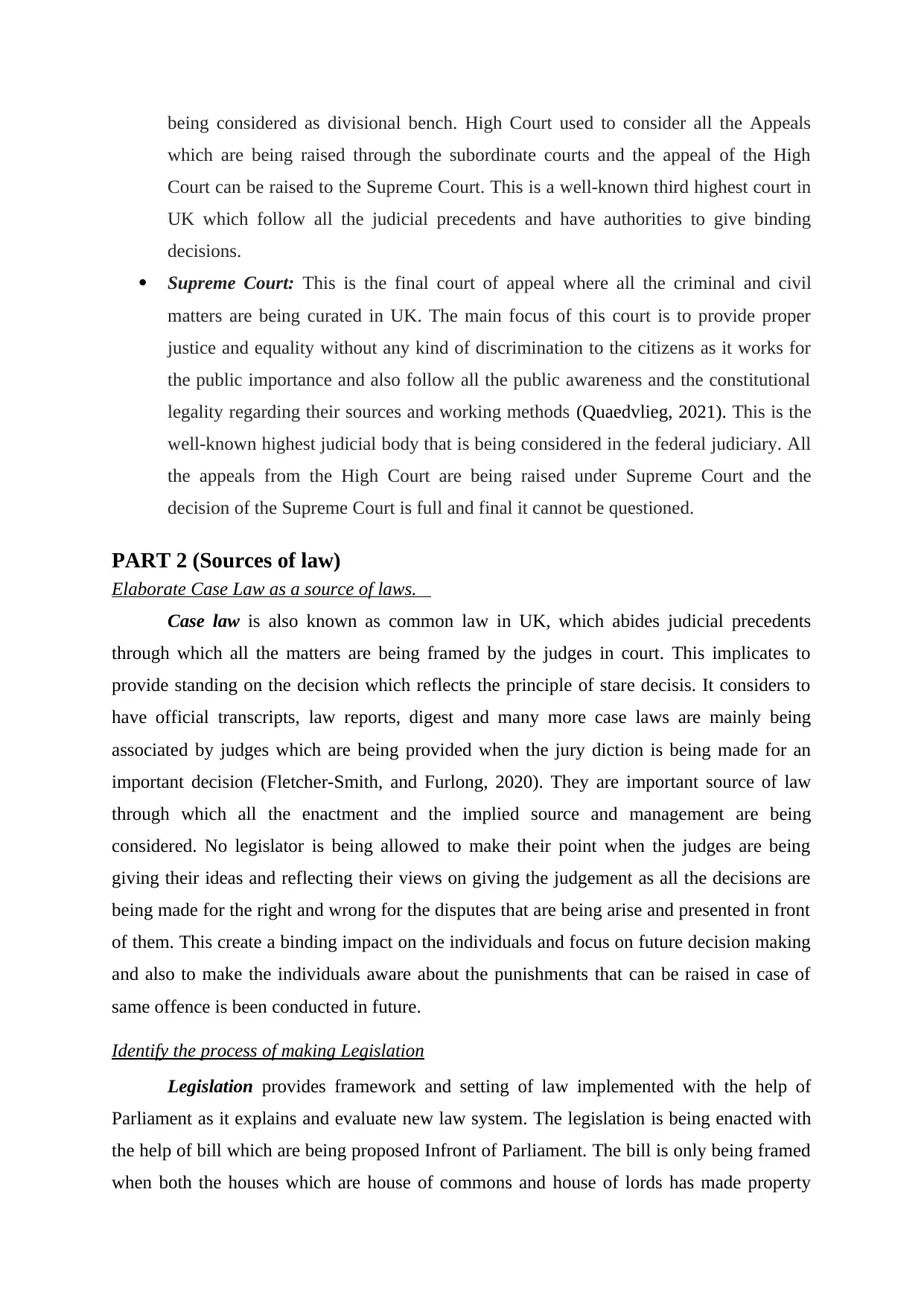
being considered as divisional bench. High Court used to consider all the Appeals
which are being raised through the subordinate courts and the appeal of the High
Court can be raised to the Supreme Court. This is a well-known third highest court in
UK which follow all the judicial precedents and have authorities to give binding
decisions.
Supreme Court: This is the final court of appeal where all the criminal and civil
matters are being curated in UK. The main focus of this court is to provide proper
justice and equality without any kind of discrimination to the citizens as it works for
the public importance and also follow all the public awareness and the constitutional
legality regarding their sources and working methods (Quaedvlieg, 2021). This is the
well-known highest judicial body that is being considered in the federal judiciary. All
the appeals from the High Court are being raised under Supreme Court and the
decision of the Supreme Court is full and final it cannot be questioned.
PART 2 (Sources of law)
Elaborate Case Law as a source of laws.
Case law is also known as common law in UK, which abides judicial precedents
through which all the matters are being framed by the judges in court. This implicates to
provide standing on the decision which reflects the principle of stare decisis. It considers to
have official transcripts, law reports, digest and many more case laws are mainly being
associated by judges which are being provided when the jury diction is being made for an
important decision (Fletcher-Smith, and Furlong, 2020). They are important source of law
through which all the enactment and the implied source and management are being
considered. No legislator is being allowed to make their point when the judges are being
giving their ideas and reflecting their views on giving the judgement as all the decisions are
being made for the right and wrong for the disputes that are being arise and presented in front
of them. This create a binding impact on the individuals and focus on future decision making
and also to make the individuals aware about the punishments that can be raised in case of
same offence is been conducted in future.
Identify the process of making Legislation
Legislation provides framework and setting of law implemented with the help of
Parliament as it explains and evaluate new law system. The legislation is being enacted with
the help of bill which are being proposed Infront of Parliament. The bill is only being framed
when both the houses which are house of commons and house of lords has made property
which are being raised through the subordinate courts and the appeal of the High
Court can be raised to the Supreme Court. This is a well-known third highest court in
UK which follow all the judicial precedents and have authorities to give binding
decisions.
Supreme Court: This is the final court of appeal where all the criminal and civil
matters are being curated in UK. The main focus of this court is to provide proper
justice and equality without any kind of discrimination to the citizens as it works for
the public importance and also follow all the public awareness and the constitutional
legality regarding their sources and working methods (Quaedvlieg, 2021). This is the
well-known highest judicial body that is being considered in the federal judiciary. All
the appeals from the High Court are being raised under Supreme Court and the
decision of the Supreme Court is full and final it cannot be questioned.
PART 2 (Sources of law)
Elaborate Case Law as a source of laws.
Case law is also known as common law in UK, which abides judicial precedents
through which all the matters are being framed by the judges in court. This implicates to
provide standing on the decision which reflects the principle of stare decisis. It considers to
have official transcripts, law reports, digest and many more case laws are mainly being
associated by judges which are being provided when the jury diction is being made for an
important decision (Fletcher-Smith, and Furlong, 2020). They are important source of law
through which all the enactment and the implied source and management are being
considered. No legislator is being allowed to make their point when the judges are being
giving their ideas and reflecting their views on giving the judgement as all the decisions are
being made for the right and wrong for the disputes that are being arise and presented in front
of them. This create a binding impact on the individuals and focus on future decision making
and also to make the individuals aware about the punishments that can be raised in case of
same offence is been conducted in future.
Identify the process of making Legislation
Legislation provides framework and setting of law implemented with the help of
Parliament as it explains and evaluate new law system. The legislation is being enacted with
the help of bill which are being proposed Infront of Parliament. The bill is only being framed
when both the houses which are house of commons and house of lords has made property
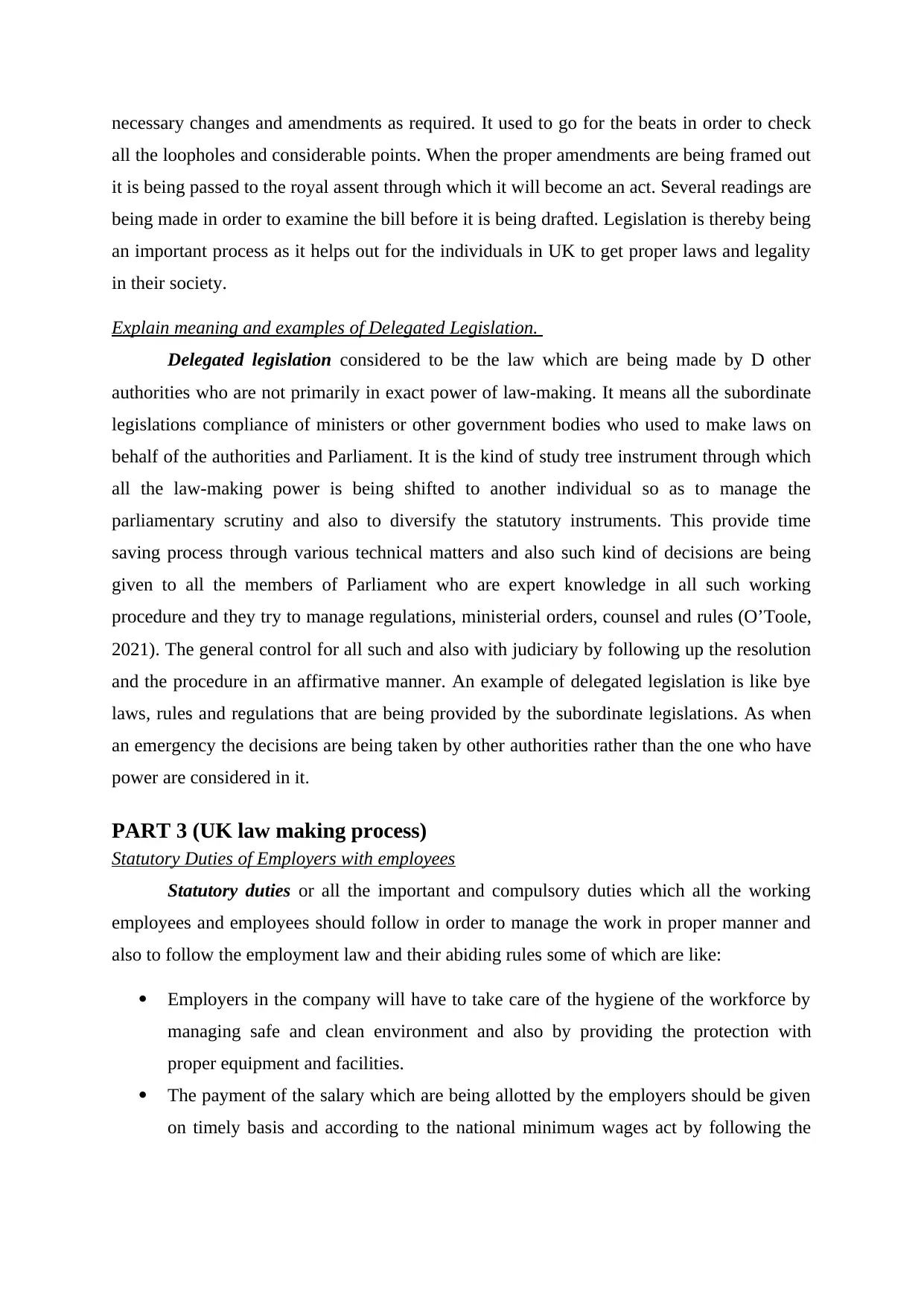
necessary changes and amendments as required. It used to go for the beats in order to check
all the loopholes and considerable points. When the proper amendments are being framed out
it is being passed to the royal assent through which it will become an act. Several readings are
being made in order to examine the bill before it is being drafted. Legislation is thereby being
an important process as it helps out for the individuals in UK to get proper laws and legality
in their society.
Explain meaning and examples of Delegated Legislation.
Delegated legislation considered to be the law which are being made by D other
authorities who are not primarily in exact power of law-making. It means all the subordinate
legislations compliance of ministers or other government bodies who used to make laws on
behalf of the authorities and Parliament. It is the kind of study tree instrument through which
all the law-making power is being shifted to another individual so as to manage the
parliamentary scrutiny and also to diversify the statutory instruments. This provide time
saving process through various technical matters and also such kind of decisions are being
given to all the members of Parliament who are expert knowledge in all such working
procedure and they try to manage regulations, ministerial orders, counsel and rules (O’Toole,
2021). The general control for all such and also with judiciary by following up the resolution
and the procedure in an affirmative manner. An example of delegated legislation is like bye
laws, rules and regulations that are being provided by the subordinate legislations. As when
an emergency the decisions are being taken by other authorities rather than the one who have
power are considered in it.
PART 3 (UK law making process)
Statutory Duties of Employers with employees
Statutory duties or all the important and compulsory duties which all the working
employees and employees should follow in order to manage the work in proper manner and
also to follow the employment law and their abiding rules some of which are like:
Employers in the company will have to take care of the hygiene of the workforce by
managing safe and clean environment and also by providing the protection with
proper equipment and facilities.
The payment of the salary which are being allotted by the employers should be given
on timely basis and according to the national minimum wages act by following the
all the loopholes and considerable points. When the proper amendments are being framed out
it is being passed to the royal assent through which it will become an act. Several readings are
being made in order to examine the bill before it is being drafted. Legislation is thereby being
an important process as it helps out for the individuals in UK to get proper laws and legality
in their society.
Explain meaning and examples of Delegated Legislation.
Delegated legislation considered to be the law which are being made by D other
authorities who are not primarily in exact power of law-making. It means all the subordinate
legislations compliance of ministers or other government bodies who used to make laws on
behalf of the authorities and Parliament. It is the kind of study tree instrument through which
all the law-making power is being shifted to another individual so as to manage the
parliamentary scrutiny and also to diversify the statutory instruments. This provide time
saving process through various technical matters and also such kind of decisions are being
given to all the members of Parliament who are expert knowledge in all such working
procedure and they try to manage regulations, ministerial orders, counsel and rules (O’Toole,
2021). The general control for all such and also with judiciary by following up the resolution
and the procedure in an affirmative manner. An example of delegated legislation is like bye
laws, rules and regulations that are being provided by the subordinate legislations. As when
an emergency the decisions are being taken by other authorities rather than the one who have
power are considered in it.
PART 3 (UK law making process)
Statutory Duties of Employers with employees
Statutory duties or all the important and compulsory duties which all the working
employees and employees should follow in order to manage the work in proper manner and
also to follow the employment law and their abiding rules some of which are like:
Employers in the company will have to take care of the hygiene of the workforce by
managing safe and clean environment and also by providing the protection with
proper equipment and facilities.
The payment of the salary which are being allotted by the employers should be given
on timely basis and according to the national minimum wages act by following the
⊘ This is a preview!⊘
Do you want full access?
Subscribe today to unlock all pages.

Trusted by 1+ million students worldwide
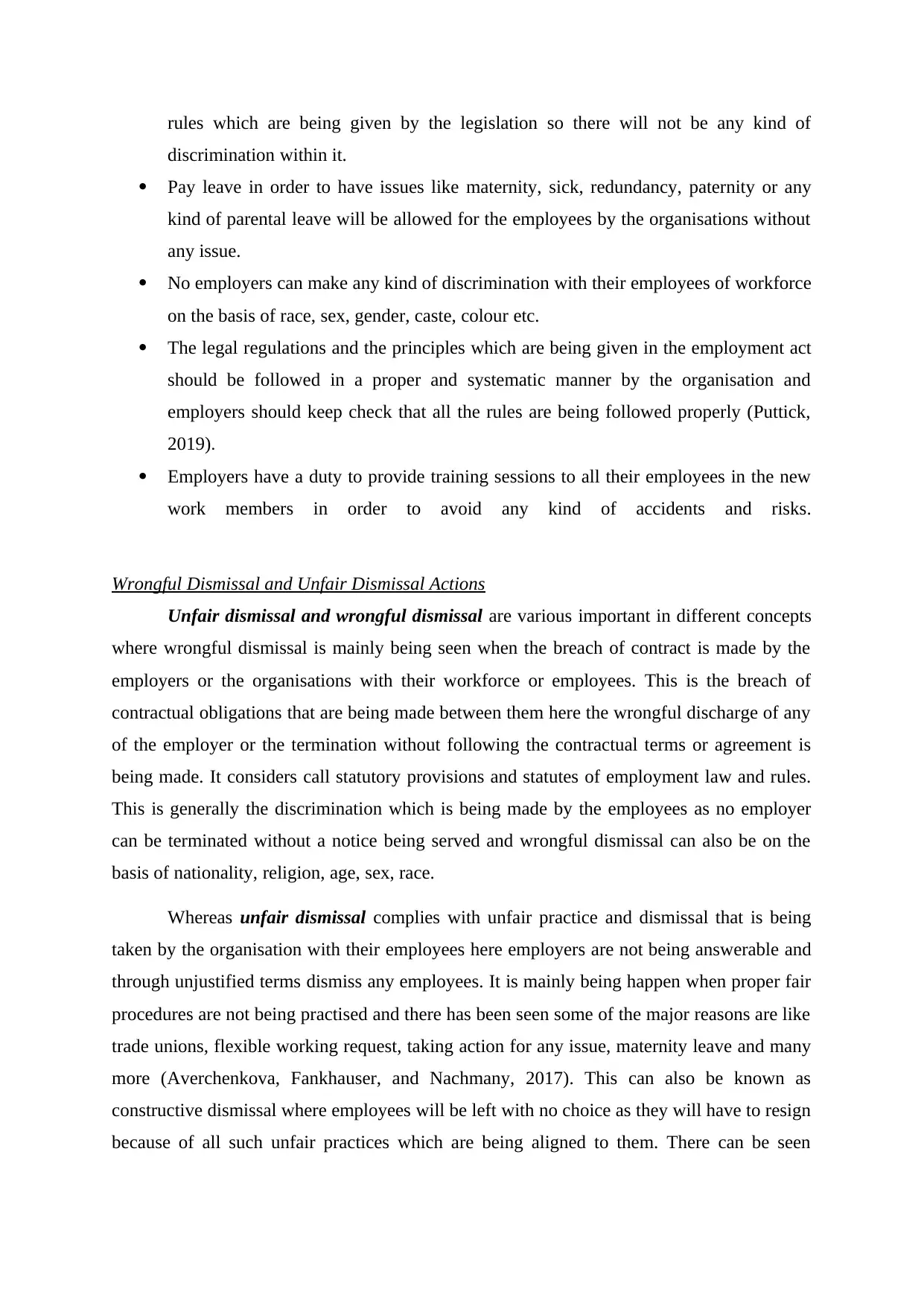
rules which are being given by the legislation so there will not be any kind of
discrimination within it.
Pay leave in order to have issues like maternity, sick, redundancy, paternity or any
kind of parental leave will be allowed for the employees by the organisations without
any issue.
No employers can make any kind of discrimination with their employees of workforce
on the basis of race, sex, gender, caste, colour etc.
The legal regulations and the principles which are being given in the employment act
should be followed in a proper and systematic manner by the organisation and
employers should keep check that all the rules are being followed properly (Puttick,
2019).
Employers have a duty to provide training sessions to all their employees in the new
work members in order to avoid any kind of accidents and risks.
Wrongful Dismissal and Unfair Dismissal Actions
Unfair dismissal and wrongful dismissal are various important in different concepts
where wrongful dismissal is mainly being seen when the breach of contract is made by the
employers or the organisations with their workforce or employees. This is the breach of
contractual obligations that are being made between them here the wrongful discharge of any
of the employer or the termination without following the contractual terms or agreement is
being made. It considers call statutory provisions and statutes of employment law and rules.
This is generally the discrimination which is being made by the employees as no employer
can be terminated without a notice being served and wrongful dismissal can also be on the
basis of nationality, religion, age, sex, race.
Whereas unfair dismissal complies with unfair practice and dismissal that is being
taken by the organisation with their employees here employers are not being answerable and
through unjustified terms dismiss any employees. It is mainly being happen when proper fair
procedures are not being practised and there has been seen some of the major reasons are like
trade unions, flexible working request, taking action for any issue, maternity leave and many
more (Averchenkova, Fankhauser, and Nachmany, 2017). This can also be known as
constructive dismissal where employees will be left with no choice as they will have to resign
because of all such unfair practices which are being aligned to them. There can be seen
discrimination within it.
Pay leave in order to have issues like maternity, sick, redundancy, paternity or any
kind of parental leave will be allowed for the employees by the organisations without
any issue.
No employers can make any kind of discrimination with their employees of workforce
on the basis of race, sex, gender, caste, colour etc.
The legal regulations and the principles which are being given in the employment act
should be followed in a proper and systematic manner by the organisation and
employers should keep check that all the rules are being followed properly (Puttick,
2019).
Employers have a duty to provide training sessions to all their employees in the new
work members in order to avoid any kind of accidents and risks.
Wrongful Dismissal and Unfair Dismissal Actions
Unfair dismissal and wrongful dismissal are various important in different concepts
where wrongful dismissal is mainly being seen when the breach of contract is made by the
employers or the organisations with their workforce or employees. This is the breach of
contractual obligations that are being made between them here the wrongful discharge of any
of the employer or the termination without following the contractual terms or agreement is
being made. It considers call statutory provisions and statutes of employment law and rules.
This is generally the discrimination which is being made by the employees as no employer
can be terminated without a notice being served and wrongful dismissal can also be on the
basis of nationality, religion, age, sex, race.
Whereas unfair dismissal complies with unfair practice and dismissal that is being
taken by the organisation with their employees here employers are not being answerable and
through unjustified terms dismiss any employees. It is mainly being happen when proper fair
procedures are not being practised and there has been seen some of the major reasons are like
trade unions, flexible working request, taking action for any issue, maternity leave and many
more (Averchenkova, Fankhauser, and Nachmany, 2017). This can also be known as
constructive dismissal where employees will be left with no choice as they will have to resign
because of all such unfair practices which are being aligned to them. There can be seen
Paraphrase This Document
Need a fresh take? Get an instant paraphrase of this document with our AI Paraphraser
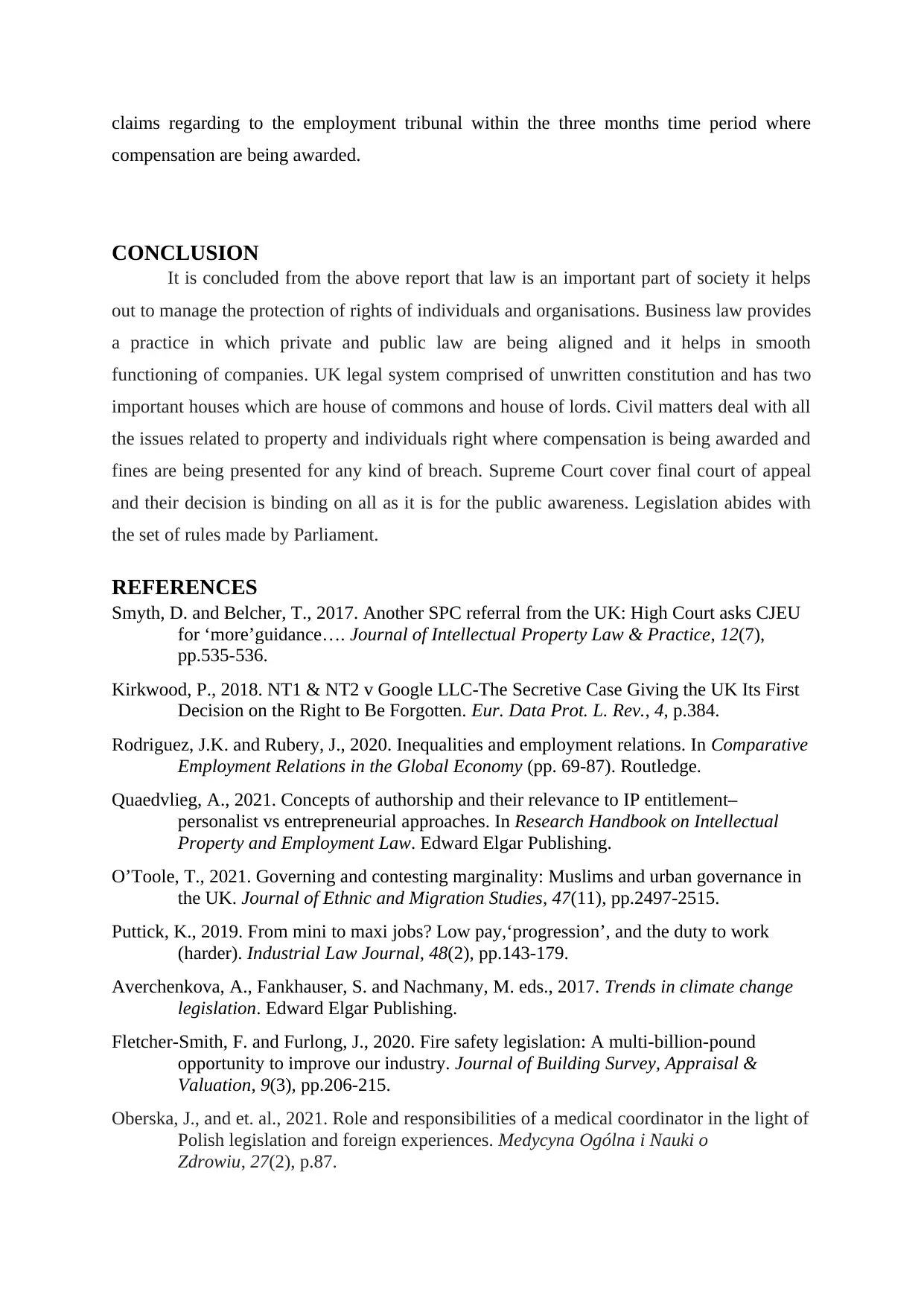
claims regarding to the employment tribunal within the three months time period where
compensation are being awarded.
CONCLUSION
It is concluded from the above report that law is an important part of society it helps
out to manage the protection of rights of individuals and organisations. Business law provides
a practice in which private and public law are being aligned and it helps in smooth
functioning of companies. UK legal system comprised of unwritten constitution and has two
important houses which are house of commons and house of lords. Civil matters deal with all
the issues related to property and individuals right where compensation is being awarded and
fines are being presented for any kind of breach. Supreme Court cover final court of appeal
and their decision is binding on all as it is for the public awareness. Legislation abides with
the set of rules made by Parliament.
REFERENCES
Smyth, D. and Belcher, T., 2017. Another SPC referral from the UK: High Court asks CJEU
for ‘more’guidance…. Journal of Intellectual Property Law & Practice, 12(7),
pp.535-536.
Kirkwood, P., 2018. NT1 & NT2 v Google LLC-The Secretive Case Giving the UK Its First
Decision on the Right to Be Forgotten. Eur. Data Prot. L. Rev., 4, p.384.
Rodriguez, J.K. and Rubery, J., 2020. Inequalities and employment relations. In Comparative
Employment Relations in the Global Economy (pp. 69-87). Routledge.
Quaedvlieg, A., 2021. Concepts of authorship and their relevance to IP entitlement–
personalist vs entrepreneurial approaches. In Research Handbook on Intellectual
Property and Employment Law. Edward Elgar Publishing.
O’Toole, T., 2021. Governing and contesting marginality: Muslims and urban governance in
the UK. Journal of Ethnic and Migration Studies, 47(11), pp.2497-2515.
Puttick, K., 2019. From mini to maxi jobs? Low pay,‘progression’, and the duty to work
(harder). Industrial Law Journal, 48(2), pp.143-179.
Averchenkova, A., Fankhauser, S. and Nachmany, M. eds., 2017. Trends in climate change
legislation. Edward Elgar Publishing.
Fletcher-Smith, F. and Furlong, J., 2020. Fire safety legislation: A multi-billion-pound
opportunity to improve our industry. Journal of Building Survey, Appraisal &
Valuation, 9(3), pp.206-215.
Oberska, J., and et. al., 2021. Role and responsibilities of a medical coordinator in the light of
Polish legislation and foreign experiences. Medycyna Ogólna i Nauki o
Zdrowiu, 27(2), p.87.
compensation are being awarded.
CONCLUSION
It is concluded from the above report that law is an important part of society it helps
out to manage the protection of rights of individuals and organisations. Business law provides
a practice in which private and public law are being aligned and it helps in smooth
functioning of companies. UK legal system comprised of unwritten constitution and has two
important houses which are house of commons and house of lords. Civil matters deal with all
the issues related to property and individuals right where compensation is being awarded and
fines are being presented for any kind of breach. Supreme Court cover final court of appeal
and their decision is binding on all as it is for the public awareness. Legislation abides with
the set of rules made by Parliament.
REFERENCES
Smyth, D. and Belcher, T., 2017. Another SPC referral from the UK: High Court asks CJEU
for ‘more’guidance…. Journal of Intellectual Property Law & Practice, 12(7),
pp.535-536.
Kirkwood, P., 2018. NT1 & NT2 v Google LLC-The Secretive Case Giving the UK Its First
Decision on the Right to Be Forgotten. Eur. Data Prot. L. Rev., 4, p.384.
Rodriguez, J.K. and Rubery, J., 2020. Inequalities and employment relations. In Comparative
Employment Relations in the Global Economy (pp. 69-87). Routledge.
Quaedvlieg, A., 2021. Concepts of authorship and their relevance to IP entitlement–
personalist vs entrepreneurial approaches. In Research Handbook on Intellectual
Property and Employment Law. Edward Elgar Publishing.
O’Toole, T., 2021. Governing and contesting marginality: Muslims and urban governance in
the UK. Journal of Ethnic and Migration Studies, 47(11), pp.2497-2515.
Puttick, K., 2019. From mini to maxi jobs? Low pay,‘progression’, and the duty to work
(harder). Industrial Law Journal, 48(2), pp.143-179.
Averchenkova, A., Fankhauser, S. and Nachmany, M. eds., 2017. Trends in climate change
legislation. Edward Elgar Publishing.
Fletcher-Smith, F. and Furlong, J., 2020. Fire safety legislation: A multi-billion-pound
opportunity to improve our industry. Journal of Building Survey, Appraisal &
Valuation, 9(3), pp.206-215.
Oberska, J., and et. al., 2021. Role and responsibilities of a medical coordinator in the light of
Polish legislation and foreign experiences. Medycyna Ogólna i Nauki o
Zdrowiu, 27(2), p.87.

⊘ This is a preview!⊘
Do you want full access?
Subscribe today to unlock all pages.

Trusted by 1+ million students worldwide
1 out of 9
Related Documents
Your All-in-One AI-Powered Toolkit for Academic Success.
+13062052269
info@desklib.com
Available 24*7 on WhatsApp / Email
![[object Object]](/_next/static/media/star-bottom.7253800d.svg)
Unlock your academic potential
Copyright © 2020–2026 A2Z Services. All Rights Reserved. Developed and managed by ZUCOL.

